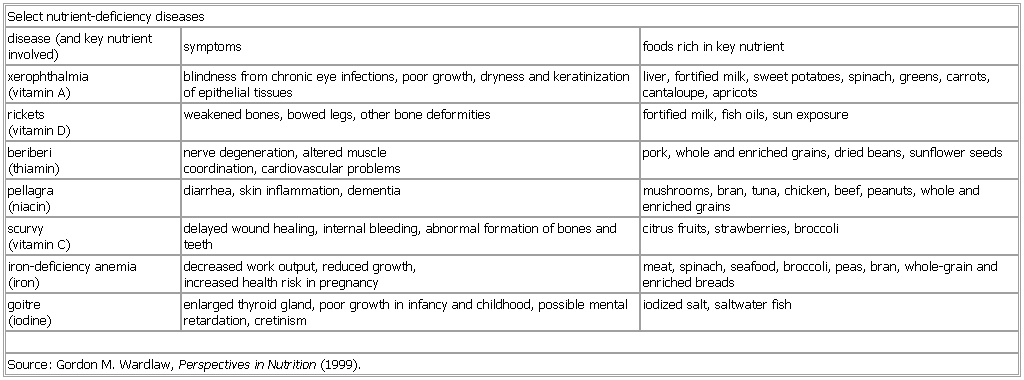Select nutrient-deficiency diseases
- Select nutrient-deficiency diseases
-
Select nutrient-deficiency diseases
disease (and key nutrient involved) symptoms foods rich in key nutrient
xerophthalmia
(
vitamin A)
blindness from chronic eye infections,
poor growth,
dryness and keratinization of epithelial tissues liver,
fortified milk,
sweet potatoes,
spinach,
greens,
carrots,
cantaloupe,
apricots (
vitamin D)
weakened bones,
bowed legs,
other bone deformities fortified milk,
fish oils,
sun exposure (
thiamin)
nerve degeneration,
altered muscle coordination, cardiovascular problems pork, whole and enriched grains, dried beans, sunflower seeds
(
niacin)
diarrhea,
skin inflammation,
dementia mushrooms,
bran,
tuna,
chicken,
beef,
peanuts,
whole and enriched grains (
vitamin C)
delayed wound healing,
internal bleeding,
abnormal formation of bones and teeth citrus fruits,
strawberries,
broccoli (
iron)
decreased work output,
reduced growth,
increased health risk in pregnancy meat, spinach, seafood, broccoli, peas, bran, whole-grain and enriched breads
(
iodine)
enlarged thyroid gland,
poor growth in infancy and childhood,
possible mental retardation,
cretinism iodized salt,
saltwater fish
Source: Gordon M.
Wardlaw,
Perspectives in Nutrition (
1999).
See as table:
* * *
Universalium.
2010.
Look at other dictionaries:
nutritional disease — Introduction any of the nutrient related diseases and conditions that cause illness in humans. They may include deficiencies or excesses in the diet, obesity and eating disorders, and chronic diseases such as cardiovascular disease,… … Universalium
Vitamin — This article is about the set of organic compounds. For the nutritional supplement preparation, see multivitamin. For the manga, see Vitamin (manga) … Wikipedia
Equine nutrition — is the feeding of horses, ponies, mules, donkeys, and other equines. Correct and balanced nutrition is a critical component of proper horse care.Horses are non ruminant herbivores of a type known as a hind gut fermentor. This means that horses… … Wikipedia
agricultural technology — Introduction application of techniques to control the growth and harvesting of animal and vegetable products. Soil preparation Mechanical processing of soil so that it is in the proper physical condition for planting is usually… … Universalium
Life Sciences — ▪ 2009 Introduction Zoology In 2008 several zoological studies provided new insights into how species life history traits (such as the timing of reproduction or the length of life of adult individuals) are derived in part as responses to… … Universalium
therapeutics — /ther euh pyooh tiks/, n. (used with a sing. v.) the branch of medicine concerned with the remedial treatment of disease. [1665 75; see THERAPEUTIC, ICS] * * * Treatment and care to combat disease or alleviate pain or injury. Its tools include… … Universalium
Vegetarianism — This article is about the deliberate diet for human beings. For types of vegetarian foods, see vegetarian cuisine. For plant based diets in non human animals, see herbivore. Vegetarianism Description A vegetarian diet is derived from plants, with … Wikipedia
feed — feedable, adj. /feed/, v., fed, feeding, n. v.t. 1. to give food to; supply with nourishment: to feed a child. 2. to yield or serve as food for: This land has fed 10 generations. 3. to provide as food. 4. to furnish for consumption. 5. to… … Universalium
Obesity — Cla … Wikipedia
environment — environmental, adj. environmentally, adv. /en vuy reuhn meuhnt, vuy euhrn /, n. 1. the aggregate of surrounding things, conditions, or influences; surroundings; milieu. 2. Ecol. the air, water, minerals, organisms, and all other external factors… … Universalium

